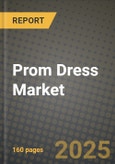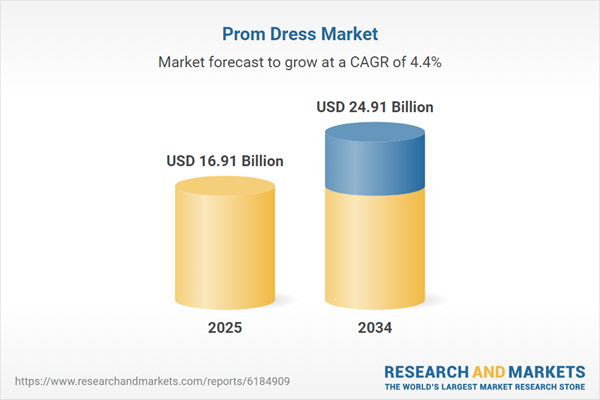Prom Dress Market
The prom dress market centers on formalwear purchased for school-leaver and high-school events, with adjacent occasions - homecoming, quinceañera, graduation parties, and debutante balls - broadening demand. The assortment spans long gowns, cocktail/minis, mermaid and A-line silhouettes, two-piece sets, jumpsuits, modest and size-inclusive ranges, and premium couture capsules. Fabrics and finishes emphasize satins, chiffons, mikado, crepe, tulle, sequins, beading, rhinestones, feather trims, and corsetry; color cycles rotate between pastels, jewel tones, metallics, and black/white minimalist palettes. Digital discovery and fast social cycles drive micro-trends seeded by influencers, streaming red carpets, and short-form video. Retail is omnichannel: specialty boutiques and trunk shows for fittings/alterations; department stores and fashion chains for breadth; DTC/marketplaces for price and speed; rentals and resale for sustainability and budget. Key drivers include event normalization post-disruption, social-media-led self-expression, size inclusivity, and accelerated design-to-floor timelines supported by near-shoring and agile production. Competitive intensity spans global fast fashion, regional formalwear labels, bridal houses with prom lines, and independent designers. Differentiation hinges on fit and construction quality (boning, lining, bust support), quick-turn inventory, alterations and customization, and ethical/sustainable sourcing narratives. Emerging themes include modular styling (detachable sleeves/overskirts), convertible lengths, sparkle without heavy beading, inclusive shade ranges for skin tones, and tech-enabled try-on, appointment booking, and fit guidance.Prom Dress Market Key Insights
- Occasion stacking lifts basket size. Coordinated looks for pre-prom events, after-parties, and graduation expand demand beyond a single gown; brands upsell shoes, bags, jewelry, shapewear, and outerwear.
- Fit engineering is the moat. Built-in corsetry, bra-friendly backlines, adjustable straps, and inclusive patterns reduce returns and alterations; boutiques win with in-house tailoring and quick nip-and-tuck services.
- Micro-trend velocity. Drops aligned to viral details - corset tops, rosettes, slit placements, draped cow necks - require tight design calendars, flexible MOQ, and rapid fabric substitution to chase demand.
- Color & fabric pragmatics. Satin and stretch crepe balance photogenic shine with wearability; matte options and double-lined knits address comfort and modesty under flash photography.
- Price tiering and access. Good-better-best ladders, Klarna-style pay-over-time, and student promos broaden reach; rentals and certified pre-loved programs appeal to sustainability-minded buyers.
- Diversity & inclusivity as default. Extended sizing, adaptive designs, modest cuts, and skin-tone-complementary hues are baseline expectations; campaigns with diverse models increase conversion.
- Omnichannel conversion. Social discovery → virtual try-on/fit quiz → appointment booking drives boutique traffic; live shopping and short-form video boost DTC; QR-enabled care/alteration tips cut post-purchase friction.
- Supply agility. Capsule production, near-shore finishing, and fabric greige stock allow late color decisions and faster replenishment around peak months; PO buffers reduce stockouts on viral styles.
- Quality signals matter. Invisible zips, secure beading, clean hems, and wrinkle-resistant packing protect unboxing and event-day photos; care labels and stain-management kits reduce claims.
- ESG narratives gain weight. Recycled fibers, certified trims, responsible beadwork, and traceable factories differentiate; take-back/resell partnerships extend lifecycle and brand goodwill.
Prom Dress Market Reginal Analysis
North America
Large high-school networks sustain predictable seasonality (late winter to spring). Specialty boutiques anchor fittings and alterations, while DTC/marketplaces push rapid-trend adoption. Size-inclusive and modest lines are essential in many districts. Social media and campus ambassadors drive discovery; rentals/resale gain share in urban markets.Europe
Demand blends school leaver balls, debutante and graduation events, with varied dress codes by country. Shoppers favor refined silhouettes, sustainable materials, and tailored fits. Department stores and boutiques coexist with fast fashion; alterations and modest options matter in multicultural cities. Event venues’ smart-casual drift supports midi lengths and minimalist gowns.Asia-Pacific
Strong social and graduation cultures in Australia, New Zealand, and parts of East/Southeast Asia; kawaii/elegant hybrids and detailed embellishment trends are influential. Rapid e-commerce logistics and live-shopping shape impulse buys, while premium custom pieces thrive in tier-1 cities. Size ranges and climate-appropriate fabrics (lightweight, breathable) are key.Middle East & Africa
Preference skews to embellished, modest silhouettes with sleeves and higher necklines; premium fabrics and couture-inspired details resonate. Family-led shopping and boutique fittings dominate; customization and quick alterations are decisive. Climate and cultural norms guide fabric choice and layering.South & Central America
Events like graduations and fifteen-year celebrations (quinceañera) create parallel demand across formal categories. Vibrant colors, statement details, and dance-friendly construction are valued. Brick-and-mortar with in-house tailoring is strong; marketplaces extend reach. Budget-flexible offers and installment plans influence conversion, with rentals emerging in major cities.Prom Dress Market Segmentation
By Fabric
- Satin
- Tulle
- Lace
- Chiffon
- Velvet
- Others
By Size
- Long-Prom Dress
- Short-Prom Dress
By Distribution Channel
- Online
- Offline
Key Market players
David’s Bridal, Sherri Hill, Jovani, Mori Lee, Mac Duggal, La Femme, Terani Couture, Faviana, Alyce Paris, Adrianna Papell, BCBGMAXAZRIA, ASOS, Windsor, House of CB, PrettyLittleThingProm Dress Market Analytics
The report employs rigorous tools, including Porter’s Five Forces, value chain mapping, and scenario-based modelling, to assess supply-demand dynamics. Cross-sector influences from parent, derived, and substitute markets are evaluated to identify risks and opportunities. Trade and pricing analytics provide an up-to-date view of international flows, including leading exporters, importers, and regional price trends.Macroeconomic indicators, policy frameworks such as carbon pricing and energy security strategies, and evolving consumer behaviour are considered in forecasting scenarios. Recent deal flows, partnerships, and technology innovations are incorporated to assess their impact on future market performance.
Prom Dress Market Competitive Intelligence
The competitive landscape is mapped through proprietary frameworks, profiling leading companies with details on business models, product portfolios, financial performance, and strategic initiatives. Key developments such as mergers & acquisitions, technology collaborations, investment inflows, and regional expansions are analyzed for their competitive impact. The report also identifies emerging players and innovative startups contributing to market disruption.Regional insights highlight the most promising investment destinations, regulatory landscapes, and evolving partnerships across energy and industrial corridors.
Countries Covered
- North America - Prom Dress market data and outlook to 2034
- United States
- Canada
- Mexico
- Europe - Prom Dress market data and outlook to 2034
- Germany
- United Kingdom
- France
- Italy
- Spain
- BeNeLux
- Russia
- Sweden
- Asia-Pacific - Prom Dress market data and outlook to 2034
- China
- Japan
- India
- South Korea
- Australia
- Indonesia
- Malaysia
- Vietnam
- Middle East and Africa - Prom Dress market data and outlook to 2034
- Saudi Arabia
- South Africa
- Iran
- UAE
- Egypt
- South and Central America - Prom Dress market data and outlook to 2034
- Brazil
- Argentina
- Chile
- Peru
Research Methodology
This study combines primary inputs from industry experts across the Prom Dress value chain with secondary data from associations, government publications, trade databases, and company disclosures. Proprietary modeling techniques, including data triangulation, statistical correlation, and scenario planning, are applied to deliver reliable market sizing and forecasting.Key Questions Addressed
- What is the current and forecast market size of the Prom Dress industry at global, regional, and country levels?
- Which types, applications, and technologies present the highest growth potential?
- How are supply chains adapting to geopolitical and economic shocks?
- What role do policy frameworks, trade flows, and sustainability targets play in shaping demand?
- Who are the leading players, and how are their strategies evolving in the face of global uncertainty?
- Which regional “hotspots” and customer segments will outpace the market, and what go-to-market and partnership models best support entry and expansion?
- Where are the most investable opportunities - across technology roadmaps, sustainability-linked innovation, and M&A - and what is the best segment to invest over the next 3-5 years?
Your Key Takeaways from the Prom Dress Market Report
- Global Prom Dress market size and growth projections (CAGR), 2024-2034
- Impact of Russia-Ukraine, Israel-Palestine, and Hamas conflicts on Prom Dress trade, costs, and supply chains
- Prom Dress market size, share, and outlook across 5 regions and 27 countries, 2023-2034
- Prom Dress market size, CAGR, and market share of key products, applications, and end-user verticals, 2023-2034
- Short- and long-term Prom Dress market trends, drivers, restraints, and opportunities
- Porter’s Five Forces analysis, technological developments, and Prom Dress supply chain analysis
- Prom Dress trade analysis, Prom Dress market price analysis, and Prom Dress supply/demand dynamics
- Profiles of 5 leading companies - overview, key strategies, financials, and products
- Latest Prom Dress market news and developments
Additional Support
With the purchase of this report, you will receive:- An updated PDF report and an MS Excel data workbook containing all market tables and figures for easy analysis.
- 7-day post-sale analyst support for clarifications and in-scope supplementary data, ensuring the deliverable aligns precisely with your requirements.
- Complimentary report update to incorporate the latest available data and the impact of recent market developments.
This product will be delivered within 1-3 business days.
Table of Contents
Companies Mentioned
- David’s Bridal
- Sherri Hill
- Jovani
- Mori Lee
- Mac Duggal
- La Femme
- Terani Couture
- Faviana
- Alyce Paris
- Adrianna Papell
- BCBGMAXAZRIA
- ASOS
- Windsor
- House of CB
- PrettyLittleThing
Table Information
| Report Attribute | Details |
|---|---|
| No. of Pages | 160 |
| Published | November 2025 |
| Forecast Period | 2025 - 2034 |
| Estimated Market Value ( USD | $ 16.91 Billion |
| Forecasted Market Value ( USD | $ 24.91 Billion |
| Compound Annual Growth Rate | 4.4% |
| Regions Covered | Global |
| No. of Companies Mentioned | 15 |









